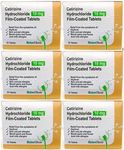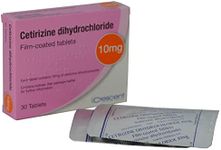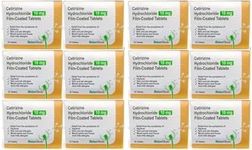Buying Guide for the Best Allergy Pills
When choosing allergy pills, it's important to consider your specific symptoms, the severity of your allergies, and any other health conditions you may have. Allergy pills can help alleviate symptoms such as sneezing, runny nose, itchy eyes, and congestion. However, not all allergy pills work the same way or are suitable for everyone. Understanding the key specifications of allergy pills can help you make an informed decision that best suits your needs.Active IngredientThe active ingredient in allergy pills is the component that helps relieve allergy symptoms. Common active ingredients include antihistamines like loratadine, cetirizine, and fexofenadine, which block histamine, a substance your body makes during an allergic reaction. Some pills may also contain decongestants like pseudoephedrine. It's important to choose an active ingredient that targets your specific symptoms. For example, if you primarily suffer from sneezing and runny nose, an antihistamine may be sufficient. If you also experience nasal congestion, a combination of antihistamine and decongestant might be more effective.
Duration of ActionThe duration of action refers to how long the effects of the allergy pill last. Some pills are designed to provide relief for 4 to 6 hours, while others offer 24-hour relief. If you need all-day relief without having to take multiple doses, a 24-hour pill might be more convenient. However, if your symptoms are mild or only occur at certain times of the day, a shorter-acting pill might be sufficient. Consider your daily routine and symptom pattern when choosing the duration of action.
DrowsinessSome allergy pills can cause drowsiness, which can affect your ability to perform tasks that require alertness, such as driving or operating machinery. First-generation antihistamines, like diphenhydramine, are more likely to cause drowsiness, while second-generation antihistamines, like loratadine and cetirizine, are less sedating. If you need to stay alert during the day, opt for a non-drowsy formula. However, if your allergies disrupt your sleep, a drowsy formula taken at night might help you rest better.
FormulationAllergy pills come in various formulations, including tablets, capsules, and liquid gels. Some are also available as dissolvable tablets or chewables, which can be more convenient for those who have difficulty swallowing pills. Consider your preference and ease of use when selecting a formulation. If you travel frequently or need to take your medication on the go, a portable and easy-to-take option might be best.
Onset of ActionThe onset of action is how quickly the allergy pill begins to work after you take it. Some pills start working within an hour, while others may take longer. If you need quick relief from sudden allergy symptoms, look for a pill with a fast onset of action. However, if your symptoms are predictable and you can plan ahead, the onset time may be less critical.















